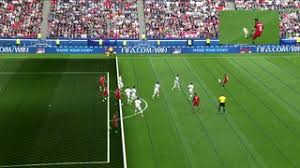By Andrew Warshaw in Moscow
June 15 – FIFA’s top refereeing watchdogs are urging the public not to expect miracles from the Video Assistant Referees (VAR) system that is making its World Cup debut in Russia. But director of refereeing Massimo Busacca nevertheless insists the system will be a help rather than a hindrance despite lingering doubts about whether VAR has been implemented too quickly in FIFA’s flagship event because of confusing rulings and long delays.
“We ran very fast getting it ready, but we are convinced of it,” Busacca told reporters. “We are ready, we know we must be ready as there can be no experiments here. I don’t think that technology solves the problem 100 percent but I’m sure and convinced that the scandals that we remember from the past we will not see any more.”
VAR is only supposed to be used for clear and obvious errors in game-changing situations: goals scored, red cards, penalty awards, plus mistaken identity. But players, fans and coaches have been left totally bemused by confusing decision-making. Although the system has been used in domestic competitions across Europe – including in top division of the German and Italian leagues and the FA Cup in England – concerns have been raised about its readiness for the World Cup.
Busacca argues that those who say it takes too long to make decisions should think about whether that is worse than wrongly-awarded goals, confirming that VAR rulings will be replayed on giant screens in stadiums so fans can see why decisions were reached.
And he compared the development of VAR to the way the World Cup’s participating teams prepare.
“It’s like a team who didn’t play well before a World Cup, made mistakes but now plays much better. No national team arrives at the World Cup perfect – it’s the same for us. We know that we have to improve.”
Pierluigi Collina, chairman of the referees committee at FIFA, when asked whether VAR cuts out the emotion of the game, replied: “Would you rather a wrong goal be celebrated or would you want to cut the celebration? I think the outcome is what counts.”
Collina, who took charge of the 2002 World Cup final between Brazil and Germany, said using VAR would relieve psychological pressures on the officials.
“We are convinced that any referee with the possibility to review the incident and change his mind and change his decision will be very helpful in terms of limiting the psychological effects on himself.”
Two referees are conspicuous by their absence in Russia, both tainted by corruption allegations and dropped from World Cup duty. The cases of Saudi Arabian referee Fahad Al Mirdasi and Kenyan assistant Aden Range Marwa “surprised us a lot,” admitted Collina.
Contact the writer of this story at moc.l1745302050labto1745302050ofdlr1745302050owedi1745302050sni@w1745302050ahsra1745302050w.wer1745302050dna1745302050

